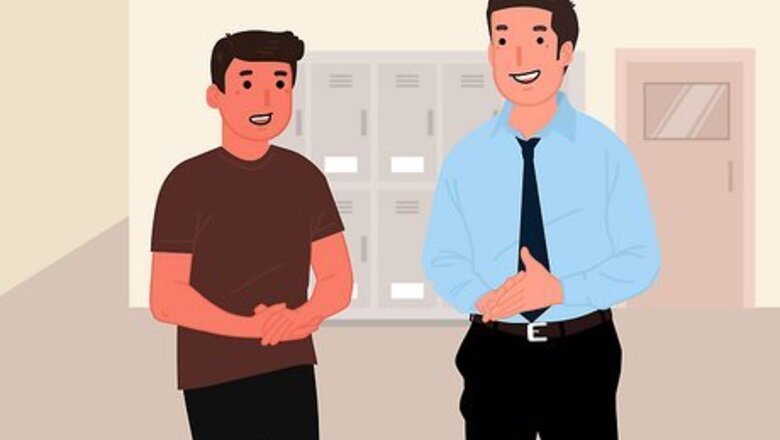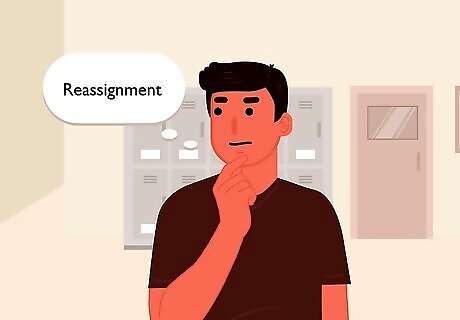
views
Talking It Out

Have a talk with your teacher. If you're really having a hard time learning because of your teacher's teaching style, consider having an open conversation with her about it. Let her know what specifically is bothering you and see if she can make some adjustments to help you learn better. For instance, if you think your teacher is too harsh of a grader, you might want to ask for some tutoring or study tips. If she speaks too quickly, find an appropriate time to talk to the teacher and kindly ask if she could speak slower because you've been having trouble understanding. If there's something going on in your personal life that is affecting you at school, let your teacher know about it. She may be much more understanding of your behavior if she understands where it's coming from. Only talk to your teacher about things that can be changed. It might help to have a conversation about comments on your homework that you don't understand, but it will not be productive to tell your teacher that you think she's mean and unfair. Instead of just blaming the teacher for the problem. show that you're willing to work together to fix it.

Talk to other students. If there are other students in the class who seem to be getting along with the teacher and doing well in the class, talk to them about their strategy. Ask them if they have encountered any of the same problems you are dealing with, and if so, what they did about it. They may have some useful tips for how to get better grades or get on this teacher's good side.

Talk to your counselor. Your school counselor is there to help you deal with all sorts of problems, both in and out of school. Your counselor can work with you to help you understand why you don't like your teacher and what you might be able to do to improve the situation. In some cases, your counselor might have a talk with you and your teacher or might recommend that you be reassigned to another class, but don't go into the meeting expecting these results.

Get your parents involved. Let your parents know how you feel about your teacher, but be sure to explain exactly why you feel that way. They may be able to offer you some good perspective and advice on how to deal with the situation. It may help to have your parents help you write down a list of things you dislike about your teacher. This can help you figure out what you can talk to the teacher about. If it has gotten to the point that you feel you are unable to manage the situation with your teacher, you can ask your parents to have a meeting with her. If that doesn't go well and your parents believe that your teacher is being unreasonable, they can go to the principal or superintendent.

Choose reassignment as a last resort. If you have exhausted all of your other options and you truly believe that your schoolwork is being affected by your bad relationship with your teacher, ask to be reassigned to another class. Keep in mind that conflict resolution is a very important skill. You will be depriving yourself of learning how to deal with tough situations if you request a reassignment without trying to work things out first.
Making the Best of the Situation

Separate the teacher from the subject. Before you decide you don't like your teacher, it's important to think carefully about what exactly your problem is. If you happen to hate math, it may be that you really don't have a problem with the teacher, but instead with the subject matter. This is an important distinction because getting a new teacher will not help your situation if you hate the subject. If you're struggling with a subject, ask your teacher for extra help or get a tutor. Once you understand the subject matter a little better, you might find that your teacher really isn't so bad after all. Try to find something that interests you about the subject and focus on that as much as possible. If you have the option to choose your own reading or research material, make sure it's something that interests you enough to keep you engaged in the class. Remind yourself that even if you don't like a certain subject, your grade is still important. Stay focused on doing your best, even if you don't think you'll ever use anything you learned in this class in the real world.

Apply yourself. If you feel that part of the problem may be that your teacher doesn't like you, try making a little extra effort in class to turn the relationship around. This means showing up on time, doing your homework, being attentive, and asking questions. Be proactive about making up missed work and letting your teacher know if you will be missing school. Don't suck up too much. This will not seem genuine.

Choose your battles. It's important not to be too argumentative with your teacher, as this will only worsen your relationship. It's okay to confront her about grades you don't understand, but don't be confrontational about it, and don't argue over every single point.

Be nice. If you think your teacher is being mean to you, you might be tempted to be mean right back to her, but this will only make the situation worse! You don't need to be overly cheery when you talk to your teacher, but always be pleasant and respectful. You may find that your good attitude will rub off on your teacher.

View it as a lesson. You will not always get along with everyone you encounter in life, and that's okay! It's important to learn how to persevere and deal with people you don't like, so try to view this experience as an important life lesson that it will help you grow into a more successful adult. Remember that you don't have to like your teacher in order to learn from him/her. As long as you are still doing well in the class, do your best to deal with your teacher. If the problem is affecting your grade or causing you to dislike school, it may not be worth it to just stick it out.



















Comments
0 comment